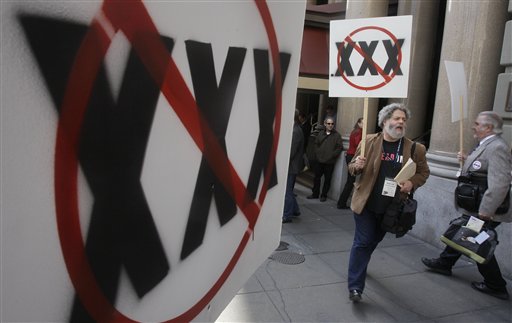Founded in 1969 as the first trade association of pornographic film producers, the Adult Film Association of America sought to limit the reach of government with regard to content censorship, defend those employed in the pornographic film industry from prosecution for obscenity or solicitation, and finance defense counsel and the filing of amicus curiae briefs at the state and federal court level in support of adult film industry defendants.
The association added to its notoriety by holding an annual adult film awards for industry participants.
At the time of the association’s inception, adult entertainment was primarily available in permit-bearing, adult-only theaters. With the advent of inexpensive home videos, the adult entertainment industry experienced a sea change. The association sought to expand its professional jurisdiction accordingly, and in the early 1970s changed its name to the Adult Film and Video Association of America (AFVAA).
Organization finances defense of adult film industry in First Amendment cases
Galvanized in 1988 by efforts of the State of California to prosecute video producer Harold Freeman for the rarely recognized crime of “pandering,” the AFVAA financed Freeman’s defense and countered the state’s assertion that “paying performers to have sex in a film was an act of prostitution.”
In 1988 in The People v. Freeman, the California Supreme Court (sitting en banc) reversed the decisions of the trial court and the court of appeals, finding that
- The defendant did not “procure another person for the purpose of prostitution” within the meaning of the pandering statute when he hired and paid actors to perform in nonobscene commercial films that portrayed sexually explicit acts, and;
- The First Amendment precludes the application of pandering statutes to the hiring of actors to perform in nonobscene motion pictures that portray sexually explicit acts.
Free Speech Coalition takes over Adult Film Association’s role
The AFVAA’s role as the trade representative for the adult entertainment industry was taken over initially by the Free Speech Legal Defense Fund (FSLDF), which in 1992 became the Free Speech Coalition. The coalition acknowledges the AFVAA as its ideological predecessor and accordingly states as its goal the opposition of efforts to pass and enforce censorship and obscenity laws within the United States.
In 1997, the Free Speech Coalition retained a California lobbyist to represent its legislative interests in the state.
This article was originally published in 2009. Carrie Archie Russell is the Assistant Dean of Undergraduate Education in Vanderbilt University’s College of Arts & Sciences. She is also the Director of Pre-Law Advising in the Department of Political Science. Her research interests include public law, judicial politics and race and public policy. Before earning her PhD from Vanderbilt, Carrie worked as a Judicial Clerk for Davidson County Tennessee’s Twentieth Judicial District.

